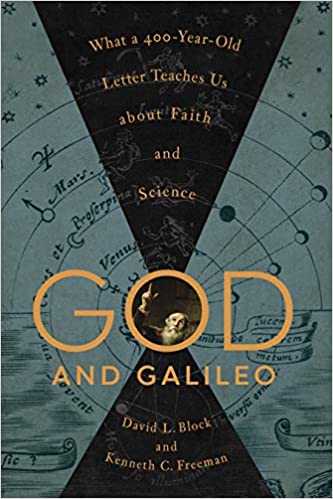A Brief Book Notice from Books At a Glance
“A devastating attack upon the dominance of atheism in science today.”
~ Giovanni Fazio, Senior Physicist, Harvard-Smithsonian Center for Astrophysics
The debate over the ultimate source of truth in our world often pits science against faith.
In fact, some high-profile scientists today would have us abandon God entirely as a source of truth about the universe.
In this book, two professional astronomers push back against this notion, arguing that the science of today is not in a position to pronounce on the existence of God―rather, our notion of truth must include both the physical and spiritual domains.
Incorporating excerpts from a letter written in 1615 by famed astronomer Galileo Galilei, the authors explore the relationship between science and faith, critiquing atheistic and secular understandings of science while reminding believers that science is an important source of truth about the physical world that God created.
From the Author’s Preface
The truth of nature belongs to the physical or scientific realm. In contrast, the much broader nature of truth includes both the physical and spiritual domains; God’s revelation of himself to us is the work of his grace. To insist that truth lies in only one or the other domain is only half the story, as in watching trees swaying and bending without recognizing the presence of the wind.
In earlier times, the church and its cardinals ruled supreme and misused the book of Scripture, claiming that it asserted things about science that it did not assert, all the while paying little regard for experimental science. This situation was clearly out of balance. Scripture is wholly true in all that it claims, and when interpreted rightly, it harmonizes perfectly with the book of nature. The church had misunderstood this principle and used Scripture to silence science.
The situation today is equally out of balance, to the other extreme. The scientific book of nature is paramount today, and many high-profile scientists would have us abandon the Scriptures entirely as a source of truth about our world. The philosophical viewpoint of these self-appointed “cardinals of science” is driven as much by the mood of the age and the personalities and beliefs of individuals as it is by scientific data and rigorous theory.
Today atheist fundamentalism rules, with its basic philosophical agenda to avoid any need for a Creator. In this book, we, as two professional astronomers, reflect on the universe of space and the grace of God. We comment on the subjective and territorial nature of science and affirm that the science of today is not in a position to pronounce on the existence of God. We argue that God is ultimately known not through human logic or experiment but through his self-revelation.
Our responses sweep from the universe of galaxies to the universe of the heart. In the words of Blaise Pascal, “The heart has its reasons, which reason does not know. We know the truth not only by the reason, but also by the heart.”1 This is God’s universe, wherein grace prevails: we need to be receptive to both reason and revelation. It should not surprise us that people who are trying to make sense of this world are provided with a map by the Maker of this world, who, by his grace, has visited his world in person.
It is these shared beliefs that led to the writing of this book….
Galileo makes a particularly constructive contribution to these questions in a famous 1615 letter dedicated to the Grand Duchess Christina of Tuscany. His letter is full of insights into the science-religion interface, and we use it as a basis for our book. This is not a book about Galileo. However, excerpts from the letter appear throughout our discussion in italics, and we use the letter as a springboard for our perspectives as professional astronomers, four hundred years later, on the mood of our age and our own exposure and response to God’s grace and revelation. In Galileo’s time, theology was the queen of all the sciences. Today, in the minds of multitudes, science is God. Is science indeed the new Savior of mankind?
Readers of the atheist literature may come away from such volumes believing that science has made God unnecessary. We wrote this book to offer a different perspective. Although science can illuminate the glories of the creation, we argue that it is beyond the domain of science to infer that God does not exist. God exists outside space and time. Science does not have the weapons to expunge God’s Spirit or the revelation of his spiritual kingdom. At the heart of God’s kingdom is grace….
Table of Contents
Part 1: Grace and Space
Setting the Stage
- Is There Grace in Space?
- Misunderstanding Truth
- Understanding the Universe and Scripture
- What Grace and Space Cannot Tell Us
- The Fraud of Scientism
- An Illusion of Conflict
- Discerning the Truth
- The Two Cathedrals
Part 2: Historical Vignettes
- A Moon of Glass from Murano, Venice
- A Troubled Dinner in Tuscany
- Winning Back Trust: Astronomy and the Vatican
Part 3: Personal Experiences of Grace
- Grace in the Life of Blaise Pascal
- Grace alongside a Telescope in South Africa
